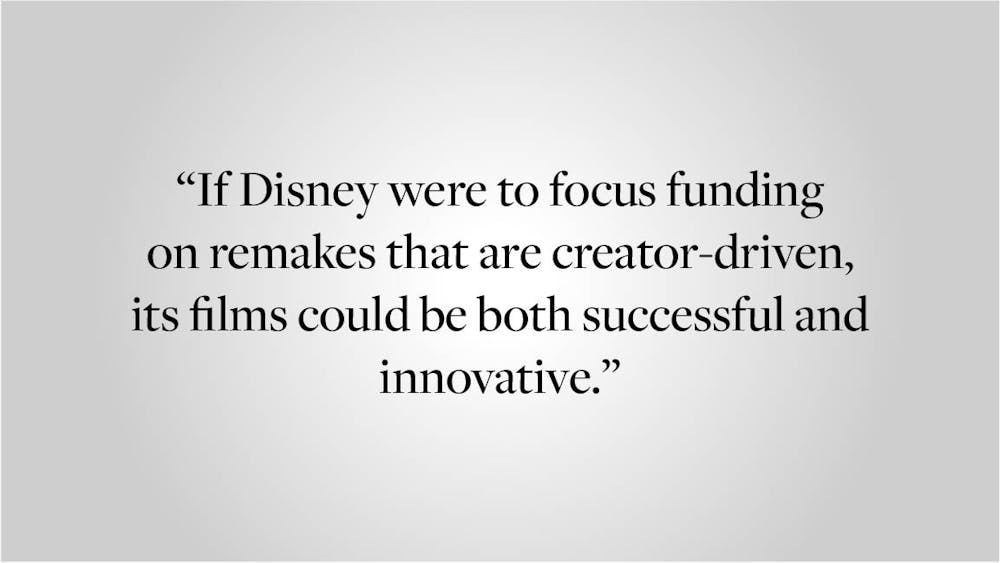Disney’s live action remakes are infamous in some movie review and filmmaking circles for being soulless cash grabs piggybacking off of the success of their classic source material. But certain creator-driven remakes in the past indicate that originality and artistry are not incompatible with success. Disney has missed its opportunity to create remakes that are artistically unique, culturally sensitive and experimental with their source material. If Disney were to focus funding on remakes that are creator-driven, its films could be both successful and innovative.
Undeniably, Disney’s recent remakes have done well at the box office. The 2019 remake of “Aladdin” grossed over one billion dollars and “The Lion King” (2019) grossed over $1.5 billion worldwide. “Mulan” (2020) fell short of these numbers, grossing a comparatively dismal $66 million worldwide, though the film did premiere online at the onset of the COVID-19 pandemic. But the films’ high gross income corresponded with high budgets, as they cost $183 million, $260 million and $200 million, respectively. Disney’s recent blockbuster remakes are both wildly profitable and wildly expensive.
Disney remakes have the potential to enhance their source content by fixing harmful stereotypes peppered into the more “vintage” films. But Disney rarely does this successfully. The live action “Aladdin” movie failed to eliminate the Orientalism of the original film, possibly due to the premise of the story itself, which the Council on American-Islamic Relations described in a press release as “rooted by racism, Orientalism and Islamophobia.” Furthermore, though Mulan originates from a poem written in the Northern Wei Dynasty, Disney failed to deliver a culturally faithful retelling with “Mulan” (1998), which was unpopular with Chinese audiences who saw the main character as inauthentic. But despite director Niki Caro emphasizing the improved cultural accuracy of the remake, the film was criticized by some Chinese viewers for containing East Asian stereotypes and flopped in China yet again. Notably, Disney opted to hire white directors for both “Mulan” (2020) and “Aladdin” (2019). If they had chosen directors with relevant cultural experiences and who were passionate about representation, these oversights could have been spotted before release.
Remakes also provide an opportunity to offer creative spins on old stories. But Disney has struggled to strike a balance between modernizing and honoring the source material. For example, “The Lion King” (2019) offered no narrative twist on the original story, essentially replicating the original film’s dialogue and camera angles. Disney instead opted to modernize the film by showcasing advanced computer-generated visual effects and designing hyper-realistic characters. Rather than improving the film, this change wiped the human expressiveness from the animals, making them completely unrelatable to many viewers. On the other hand, while the visual effects and costume design in “Mulan” (2020) were impressive, earning Oscar nominations, Disney leached the joy and humor from the original’s script. “Aladdin” (2019) fell short on both fronts — Disney changed the script and visuals enough to create a distinct film but failed to capture the original’s charm due to dragging musical sequences, disruptive CGI and an overall creative restraint not present in the first film.
The success of the Netflix series “Arcane,” set in the universe of the popular video game “League of Legends” and released in November 2021, demonstrated that Disney’s model is not the only viable one for remakes. While estimates of revenue from streaming shows are not always publicly available, “Arcane” performed admirably in other streaming metrics. The show was the number one digital original series in the United States the week of its release, according to one report, and it maintained a spot in the top 10 for weeks after. The show was beloved by its viewers, despite receiving relatively little attention from critics at first. “Arcane” set audience score records for Netflix shows on multiple platforms, including Rotten Tomatoes, Metacritic and IMDB, garnering 163,000 reviews on the latter at the time of publication.
Like Disney remakes, “Arcane” leveraged a popular franchise to guarantee a solid viewer-base, drawing inspiration from its video game material. But unlike Disney, Studio Fortiche, the production company behind the show, elevated the source content to create an original story paired with a masterful visual experience. Instead of relying on existing plot points and dynamics, Studio Fortiche used the game’s established universe to write a story that can stand alone. Studio Fortiche employed an innovative animation style, blending the efficiency of 3D animation with the textural quality of 2D, which resulted in an engaging viewing while staying true to the essence of video game cartoon aesthetics. “Arcane’s” popularity expanded beyond “League of Legends” fans due to its quality animation and compelling storytelling. These creative accomplishments can be partly attributed to the fact that Studio Fortiche is owned by artists who exercise greater creative freedom than their counterparts at larger companies.
Disney itself has proven that it can produce a quality remake of existing stories in the past. Its 1994 remake of “The Jungle Book” received positive critical reception and also performed reasonably well financially. Notably, “The Jungle Book'' was initially going to be an independent project by Indian producer Raju Patel. Disney clearly has the capability to support artists to create critically and financially successful films. Instead, the studio has relied on nostalgia for classic stories to guarantee ticket sales for its recent remakes. But “Arcane” demonstrates that relinquishing creative control to artists can create entertainment that is both successful and innovative. Hopefully, “Arcane’s” reception will inspire Disney executives to elevate the voices of artists instead of rehashing the same films because they are safe financial bets.
Megan Slusarewicz ’23 can be reached at megan_slusarewicz@brown.edu. Please send responses to this opinion to letters@browndailyherald.com and other op-eds to opinions@browndailyherald.com.





